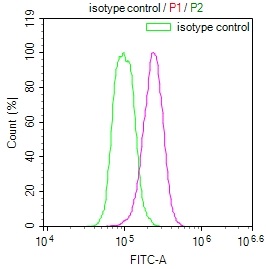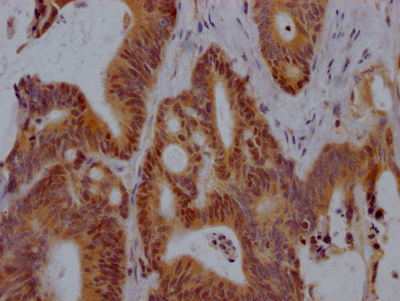FMO3 Antibody
-
中文名稱:FMO3兔多克隆抗體
-
貨號:CSB-PA008749GA01HU
-
規格:¥3,900
-
其他:
產品詳情
-
Uniprot No.:
-
基因名:FMO3
-
別名:Dimethylaniline monooxygenase [N oxide forming] 3 antibody; Dimethylaniline monooxygenase [N-oxide-forming] 3 antibody; Dimethylaniline monooxygenase 3 antibody; Dimethylaniline oxidase 3 antibody; dJ127D3.1 antibody; Flavin containing monooxygenase 3 antibody; FMO 3 antibody; FMO form 2 antibody; FMO II antibody; FMO3 antibody; FMO3_HUMAN antibody; FMOII antibody; Hepatic flavin containing monooxygenase 3 antibody; Hepatic flavin-containing monooxygenase 3 antibody; MGC34400 antibody; TMAU antibody; Trimethylamine monooxygenase antibody
-
宿主:Rabbit
-
反應種屬:Human
-
免疫原:Human FMO3
-
免疫原種屬:Homo sapiens (Human)
-
抗體亞型:IgG
-
純化方式:Ammonium Sulfate Precipitation
-
濃度:It differs from different batches. Please contact us to confirm it.
-
保存緩沖液:PBS with 0.1% Sodium Azide, 50% Glycerol, pH 7.3. -20°C, Avoid freeze / thaw cycles.
-
產品提供形式:Liquid
-
應用范圍:ELISA,WB,IHC
-
Protocols:
-
儲存條件:Upon receipt, store at -20°C or -80°C. Avoid repeated freeze.
-
貨期:Basically, we can dispatch the products out in 1-3 working days after receiving your orders. Delivery time maybe differs from different purchasing way or location, please kindly consult your local distributors for specific delivery time.
-
用途:For Research Use Only. Not for use in diagnostic or therapeutic procedures.
相關產品
靶點詳情
-
功能:Essential hepatic enzyme that catalyzes the oxygenation of a wide variety of nitrogen- and sulfur-containing compounds including drugs as well as dietary compounds. Plays an important role in the metabolism of trimethylamine (TMA), via the production of trimethylamine N-oxide (TMAO) metabolite. TMA is generated by the action of gut microbiota using dietary precursors such as choline, choline containing compounds, betaine or L-carnitine. By regulating TMAO concentration, FMO3 directly impacts both platelet responsiveness and rate of thrombus formation.
-
基因功能參考文獻:
- Finally, understanding the binding mode of methimazole and indole could be advantageous for development of hFMO3 inhibitors, currently investigated as a possible treatment strategy for atherosclerosis PMID: 29959003
- Report developmental regulation of hepatic FMO3 expression. PMID: 26839369
- the involvement of flavin-containing monooxygenase-3 (FMO3) and cytochrome P450 enzymes (CYPs) in Busulphan metabolic pathway, is reported. PMID: 29121650
- FMO3 protein abundance is significantly associated with age, gender, and genotype PMID: 28819071
- FMO3 Variant is associated with chronic kidney disease. PMID: 27513517
- The two FMO3 mutants were in close linkage disequilibrium and might play an important role in the pharmacokinetics of sulindac in Chinese healthy male volunteers. PMID: 28331852
- mechanism of hFMO3 which could be valuable not only for screening of new chemical entities but more significantly for designing of novel inhibitors of this important Phase I drug metabolising enzyme. PMID: 27523475
- Olanzapine clearance was not affected by CYP2D6 or FMO3 genotypes or smoking behavior as a single factor under the present conditions because olanzapine clearance is mediated by multiple enzymes involved in two major and one minor pathways PMID: 26856397
- Oxidative stress-responsive transcription factor NRF2 is not indispensable for the human hepatic Flavin-containing monooxygenase-3 (FMO3) gene expression in HepG2 cells PMID: 26616280
- FMO3 gene polymorphism E158K is a significant predictor of predisposition to chronic heart disease in women. PMID: 26519273
- FMO3 is centrally involved in the pathogenesis of atherosclerosis by regulating cholesterol metabolism and insulin resistance. [Review] PMID: 26218418
- FMO3 expression is increased in obese/insulin resistant patients. PMID: 25849138
- These results suggest that genetic polymorphism in the human FMO3 gene may lead to changes of drug interactions for N- or S-oxygenations of xenobiotics and endogenous substances. PMID: 25760532
- Effect of two-linked mutations of the FMO3 gene on itopride metabolism in Chinese healthy volunteers PMID: 25224784
- Three polymorphisms were found in intronic regions of FMO3 in a child with trimethylaminuria and in her parents and a brother. The parents and brother showed no symptoms. PMID: 25288227
- Comparisons of genotype and phenotype reveal that severe trimethylaminuria is caused by loss of function mutations in FMO3 PMID: 24028545
- results show that FMO3 E158K and POR A503V polymorphisms are minor sources of nicotine metabolism variation, insufficient to appreciably alter smoking. PMID: 24448396
- CYP3A4 and FMO3 are the major enzymes responsible for the metabolism of teneligliptin in humans. PMID: 23855261
- FMO3 (rs2266780) was in complete linkage disequilibrium with FMO6. PMID: 24173915
- single-nucleotide polymorphisms in the FMO3 gene is associated with chronic allograft dysfunction. PMID: 23350966
- Novel variations in the FMO3 gene associated with trimethylaminuria. PMID: 23791655
- provides fundamental, up-to-date information on the importance of human FMO3 in individual xenobiotic oxygenations, including those of new medicines and dietary-derived trimethylamine PMID: 23567996
- FMO3 heterozygote genotypes increase the risk of stroke 6 times in hypertensives in Turkish population. PMID: 23510775
- Polymorphisms in FMO3 influence nicotine clearance and that these genetic variants in turn influence cigarette consumption. PMID: 23211429
- Genetic variations in the FMO3 gene in patients with trimethylaminuria do not always present with fish-like body odor. PMID: 23266626
- Six novel variants of the FMO3 gene have been found responsible for trimethylaminuria in a Japanese population. PMID: 22819296
- It was found that FMO3 158K, 257M and 308G alleles, demonstrate impaired metabolism toward many FMO3 substrates, were observed frequently in Turkish population similar to the other populations PMID: 22409263
- patient heterozygous for 4 FMO3 mutations PMID: 21075259
- This study is the first to demonstrate a gene-environment interaction in SIDS. The findings suggest that the common polymorphism G472A of FMO3 could act as an additional genetic SIDS risk factor in children whose mothers smoke. PMID: 20198379
- These data suggest that birth is necessary, but not sufficient for the onset of FMO3 expression. A gender-independent increase in FMO3 expression was observed from 11 to 18 y of age. PMID: 11809920
- two new polymorphisms, His132-FMO3 and Pro360-FMO3, were identified; the effect of the amino acid substitutions on the function of FMO3 was evaluated PMID: 12814961
- Data show that the frequencies of FMO3 mutant alleles varied not only in different ethnic groups, but also in different populations that stemmed from the same ethnic group. PMID: 12903042
- ..FMO3 appears to be the most important flavin-containing monoxygenase..in adult human liver. p. 574 ..human FMO3 appears to oxygenate nucleophilic heteroatom-containing substrates.." p. 576 PMID: 15203093
- FMO3 displayed a significant, dominant liver-specific mRNA profile. PMID: 16183778
- variants in the FMO3 gene do not predispose to essential hypertension in a cardiovascular disease population of 1649 individuals, 691(41.9%) of whom had a history of hypertension requiring drug treatment PMID: 16324215
- Flavin-containing monooxygenase 3 (FMO3) is responsible for the majority of FMO-mediated xenobiotic metabolism in the adult human liver. PMID: 16481213
- Genetic basis of trimethylaminuria is studied in Italian pedigrees and shows a spectrum of variation in the FM03 gene with 3 novel mutations: a de novo missense mutation, a deletion (G1182del) at codon 394 and a novel missense mutation (R238P). PMID: 16600650
- The genotypes and allele frequencies of the MDR1/C3435T, FMO3/G488A, FMO3/A923G and CYP1A2/G-3860 A polymorphisms were not significantly different in cancer-free subjects and CRC patients. PMID: 16800822
- The study is said to be the first report for significant single nucleotide polymorphisms of the FMO3 causing amino acid substitutions in Japanese trimethylaminuria patients. PMID: 16858129
- As summarized in this review, FMO3 is apparently unique to the human, yet is the most abundant FMO family member in the adult human liver, whereas FMO1 dominates in most animal models. PMID: 16863467
- Individuals homozygous for either of the nonsense mutations--Arg500Stop and/or Cys197Stop--alleles in the FMO3 gene can possess abnormal trimethylamine N-oxygenation. PMID: 16996766
- results suggest that the effects of genetic variation of FMO3 could operate at the functional level for N- & S-oxygenation for typical FMO3 substrates PMID: 17142560
- abnormal FMO3 capacity is caused by menstruation particularly in the presence, in homozygous form, of mild genetic variants such as [Glu158Lys; Glu308Gly] that cause a reduced FMO3 function PMID: 17257434
- A homology model for FMO3 was constructed based on the crystal structure for yeast FMO which places the N61 residue alone, of the mutants analyzed here, in close proximity to the FAD catalytic center. PMID: 17531949
- This review summarizes the current state of research on the genetic polymorphisms of FMO3, with a focus on their clinical implications in gastrointestinal diseases. PMID: 17559352
- Mutations of the FMO3 gene were investigated in Japanese trimethylaminuria that showed low FMO3 metabolic capacity. PMID: 17584019
- FMO3 is the primary human adult liver FMO enzyme, but is developmentally regulated PMID: 17786630
- TG100435 and TG100855 were interconverted metabolically. FMO3 seem to be the major N-oxidizing enzyme, whereas cytochrome P450 reductase seems to be responsible for the retroreduction reaction. PMID: 17881660
- The results provide evidence that FMO3 has been the subject of balancing selection. PMID: 17885620
- Site-directed mutagenesis studies suggest that the putative hepatic nuclear factor-4 (HNF-4) binding site and CCAAT box could be responsible cis-acting elements of the FMO3 gene in a Japanese population. PMID: 18305374
顯示更多
收起更多
-
相關疾病:Trimethylaminuria (TMAU)
-
亞細胞定位:Microsome membrane; Single-pass membrane protein. Endoplasmic reticulum membrane; Single-pass membrane protein.
-
蛋白家族:FMO family
-
組織特異性:Liver.
-
數據庫鏈接:
Most popular with customers
-
YWHAB Recombinant Monoclonal Antibody
Applications: ELISA, WB, IHC, IF, FC
Species Reactivity: Human, Mouse, Rat
-
Phospho-YAP1 (S127) Recombinant Monoclonal Antibody
Applications: ELISA, WB, IHC
Species Reactivity: Human
-
-
-
-
-
-



















